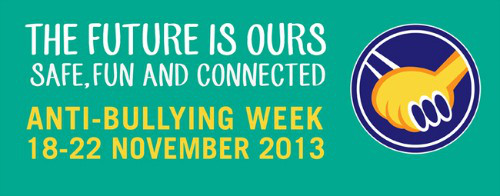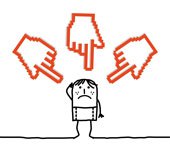Anti-Bullying Week 2013: Advice for parents on cyber-bullying
Luke Roberts is National Coordinator of the Anti-Bullying Alliance and Anti-Bullying Week. Yesterday he spoke to us about Anti-Bullying Week and the rise and impact of cyber-bullying.
In the second of this two-part series, Luke talks to us about how to spot signs of cyber-bullying, what to do when your child is the bully, and how best to help your child if they are being bullied.

What are the signs that someone may be being cyber-bullied?
Every child is different so I would say the most important thing to keep an eye out for is a change in behaviour. For example:
- Are they becoming more quiet?
- Do they hold on to their device more than before?
- Are they getting more angry or being aggressive to siblings?
Children often have trouble articulating what is going on. That’s why it’s so important to keep an open dialogue with them.
What are the first steps when you discover your child is being cyber-bullied?
- Most importantly, save the evidence. If your child is being bullied online, make screenshots, and save messages and videos. It can be very tempting to delete harmful comments, but if you have to present it to the school it’s important to have the log of events.
- Report negative comments or abusive material if you can. Lots of social networking sites have something in their terms and conditions about how to report or block abuse.
- Give young people confidence that things will be resolved. There is no point in reporting abuse if the perpetrator just gets told off and the bullying carries on. A resolution is needed so that the child feels safe again.
What if you suspect your child is doing the bullying?
Try to understand from your child what has happened to make them treat that person in that way. Kids often believe the victim has done something to deserve such treatment, but remember, never collude with your child about the reason why they are picking on someone.
Explore with them other ways that they can resolve their conflict with the person.
 Sometimes people bully others to impress their peer group in order to feel part of a group. But try to help your child to understand that what they say online will be stored there forever and could come back haunt to them in the future. Explore other ways that your child could feel part of the group.
Sometimes people bully others to impress their peer group in order to feel part of a group. But try to help your child to understand that what they say online will be stored there forever and could come back haunt to them in the future. Explore other ways that your child could feel part of the group.
Sometimes bullies are ‘keyboard warriors’. They might not be that powerful in the real world but have a lot of influence online or in their social network.
Youngsters don’t always see the instant impact of their cyber-behaviour on their victim – they don’t have empathy for the person they are bullying because they are removed from them. People are much more cruel when they are anonymous and don’t have to account for their actions.
How can parents help to prevent cyber-bullying?
One of the challenges parents face is that we don’t have a reference point. We sometimes find it hard to understand cyber-bullying because it wasn’t a part of our childhood.
Strategies like ‘just ignore them’ don’t work in the same way because there is no escape – the end of the school day doesn’t herald a respite as the bullying continues into the evening.
- Make sure children can come and talk to you. Check in with them about how they are, online and offline. Think of networking sites like Twitter and Facebook like you would a youth club – ask your children how things are going, ask probing questions and make sure the door is always open to them to come to talk to you.
- Try to find out what social networks your child is on. Educate yourself on each community so you can better understand where your child spends their time.
- Don’t think that just because your child is older, they are not at risk of being bullied. 16-17 year olds might think they are mature but they don’t necessarily have the life skills to deal with being bullied. Also, keep an eye on your youngsters as they transition from primary to secondary school – that tends to be when the pressure to join social networks starts.
Schools and parents sometimes blame each other for the lack of education and prevention of bullying. There are two parts to the problem – both technical and behavioural. We have to try to address both.
The sooner parents start talking to their children, the easier kids can deal with cyber-bullying if it happens. Everyone is different and something that upsets one person might not upset the next, which is why it’s important for parents to understand what their own children can cope with and how to help them through this difficult time.
Where can kids, parents and teachers go to get ongoing support?
The Anti-Bullying Alliance website should be the first step, acting as a gateway to further information. We have a broad membership, so there are resources for children and young people, and for their parents. For professionals there are video clips featuring experts giving advice.
If we can get it right in the UK, we think it is replicable across the world. We are being looked to as leaders in this area and have been asked for advice internationally.
Image of cyber-bullying courtesy of Shutterstock.
Article source: http://feedproxy.google.com/~r/nakedsecurity/~3/Jgpon9zvqjA/